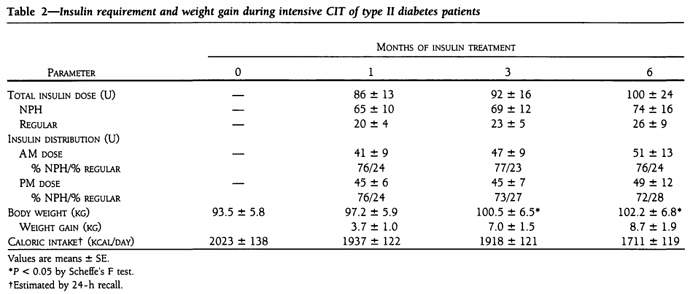This study to see the result of tightly controlled glucose in 14 type 2 diabetics who were all just starting to be unable to get glucose into pre-diabetic ranges with medication other than insulin. The study itself is not that interesting, but the narrative about how to treat diabetics in the early 90s is interesting.
But something that popped out at me when looking at the data was the increase in insulin over the 6 months to try to keep their glucose in a tight range and fighting insulin resistance by adding more insulin. Of course that sounds crazy, but you can see the numbers. The further they went, the more insulin resistant they became, the more insulin they needed to do the same job … and these people were getting 100 units of insulin a day by the end. So look at what else changes as they pile on the insulin - body weight, In 6 months they pit on 8.7 ± 1.9 kgs. That is a lot in 6 months just to move their mean plasma glucose from 17.5 ± 0.9 to 7.7±0.7 mmol/l.
Did you notice the other change … how many calories they were eating. They started at 2023±138 kCal. After a month of hard core insulin therapy they’d put on 3.7±1.0 kgs and they were eating 1937±122 kCal. By the 3 month followup they needed 6 units more insulin every day to achive the same glucose control and they had packed on 7.0±1.5 kgs from baseline … and they were eating even less 1918±121 kCal. At the final followup at 6 months to keep up their glucose control they were now injecting an additional 8 units every day, and now they were 8.7±1.9 kgs above the baseline weight … and now they are eating 1711±119 kCal a day.
Anyone still think you can reduce calories and lose weight and insulin doesn’t matter?

